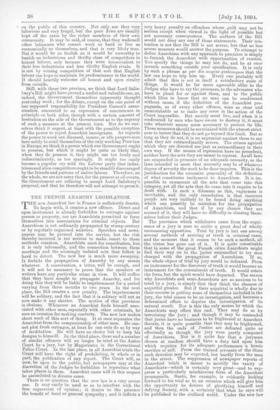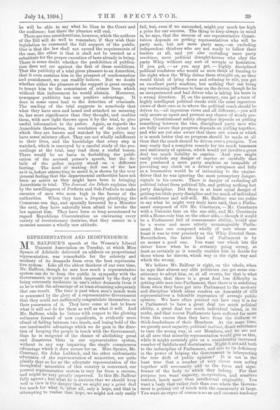THE FRENCH ANARCHY LEGIS14TION. T HE new Anarchist law in France
is sufficiently drastic. To begin with, it creates a new offence. Direct and open incitement is already forbidden to outrages against person or property, nor are Anarchists permitted to form themselves into associations for criminal objects. But Anarchism is not ordinarily propagated by stump-oratory or by regularly organised societies. Speeches and news- papers may be pressed into the service, but the risk thereby incurred is too serious to make resort to these methods common. Anarchists meet for consultation, but it is only informally, and the connection between these meetings and the seemingly isolated acts that follow is hard to detect. The new law is much more sweeping. It forbids the propagation of Anarchy by any means whatever. A conversation, a letter, will be enough, and it will not be necessary to prove that the speakers or writers have any particular crime in view. It will suffice that they have sought to propagate Anarchy, and for doing this they will be liable to imprisonment for a, period varying from three months to two years. In the next place, the Bill creates a new penalty. The imprisonment will be solitary, and the fact that it is solitary will not as now make it any shorter. The motive of this provision is obvious. Whenever an Anarchist finds himself asso- ciated with other men, especially with other criminals, he sees an occasion for making converts. The new law makes short work of this sort of thing. It at once separates the Anarchist from the companionship of other men. He can- not plot fresh outrages, at least he can only do so by way of meditation. He will have no choice but to keep his designs to himself. In the third place, these and a number of similar offences will no longer be tried at the Assize Court by a jury, but by Magistrates in the Correctional Police Court. In the last place, in all Anarchist trials the Court will have the right of prohibiting, in whole or in part, the publication of any report.. The Court will, as now, be open to the public, but newspapers may at the discretion of the Judges be forbidden to reproduce what takes places in them. Anarchist cases will in this respect be assimilated to divorce cases.
There is no question that the new law is a very severe one. It may easily be used so as to interfere with the free expression of opinion ; it denies to the prisoner the benefit of local or general sympathy ; and it inflicts a very heavy penalty on offenders whose guilt may not be serious except when viewed in the light of possible but not necessary consequences. The authors of the Bill would not deny any one of these statements. Their con- tention is not that the Bill is not severe, but that no less severe measure would answer the purpose. To attempt to define Anarchism with any approach to precision is simply to furnish the Anarchist with opportunities of evasion. You specify the things he may not do, and he at once invents something outside your specification. It is only by such a phrase as pew des moyens quelconques that the law can hope to trip him up. Every one probably will admit that this is not in itself a satisfactory state of things. It would be far more agreeable alike to the Judges who have to try the prisoners, to the advocates who have to plead for or against them, and to the public which likes to know that no man can be condemned without cause, if the definition of the Anarchist pro- paganda, as of every other offence, were so clear and unmistakable as to make any error in the action of the Court impossible. But society must live, and when it is confronted by men who have sworn to destroy it, it must take whatever means seem necessary to protect its life. Those measures should be scrutinised. with the utmost strict ness to insure that they do not go beyond this limit. But so long as they do not, it is no argument against them to say • that they are extraordinarily severe. The crimes against which they are directed are just as extraordinary in their own way. If the means of repression have no -precedent, neither have the acts they are meant to repress. As all laws are suspended in presence of an adequate necessity, so the laws intended to meet that necessity may be of whatever degree of severity the work to be done requires. This is the • justification for the excessive generality of the definition of what constitutes incitement to Anarchism. It is im- possible to enumerate all the acts that come into this category, yet all the acts that do come into it require to be dealt with. In such a dilemma as this, vagueness is inevitable, and the only consolation is that innocent people are very unlikely to be found doing anything which can possibly be mistaken for the propagation of Anarchism, and that if by any chance they are accused of it, they will have no difficulty in clearing them- selves before their Judges.
The provision which withdraws cases from the cogni- sance of a jury is sure to excite a great deal of wholly unreasoning opposition. Trial by jury is but one among several methods of arriving at truth in criminal cases, and the moment that it ceases to be such a method, all the virtue has gone out of it. It is quite conceivable that in some of the great French cities Anarchists might find their way on. to the juries empanelled to try men charged with the propagation of Anarchism. If so, the whole object of trial by jury would be defeated. From an instrument for the discovery of truth it would become an instrument for the concealment of truth. It would retain the form, but the spirit would have departed. The reason why Anarchists and semi-Anarchists are so anxious to be tried by a jury, is simply that they think the chances of acquittal greater. But if their acquittal is wholly due to their success in getting some of themselves included in the jury, the trial ceases to be an investigation, and becomes a determined effort to deprive the investigation of its natural result. Nor is this the only means by which the Anarchists may effect this end. They may do so by terrorising the jury ; and though it may be contended that juries have no business to be frightened at Anarchist threats, it is quite possible that they may be frightened, and then the ends of Justice are defeated quite as effectually as though . the jury were partly composed of Anarchists. Nor is it quite fair that a juryman chosen at random should have a duty laid upon him which requires for its adequate performance a heroic sacrifice of self. From the trained servants of the State such devotion may be expected, but hardly from the man in the street. The suppression of newspaper reports of Anarchist trials is meant to mortify the vanity of Anarchists—which is certainly very great—and to sup- press a particularly mischievous form of the Anarchist propaganda. Santo, for example, is evidently looking forward to his trial as to an occasion which will give him the opportunity he desires of glorifying himself and defying Society, with a certainty that what he says will be published to the civilised world. Under the new law he will be able to say what he likes to the Court and the audience ; but there the pleasure will end. There are two considerations, however, which the authors of the Bill will do well to remember, if they -wish their legislation to command the full support of the public. One is that the law shall not exceed the requirements of the case, the other is that it shall not be treated as a substitute for the proper execution of laws already in being. There is some doubt whether the prohibition of publica- tion does not err against the first of these conditions. That the publicity of a trial gives pleasure to an Anarchist, that it even sustains him in the prospect of condemnation and punishment, we can readily believe. But we doubt whether either the pleasure or the support is great enough to tempt him to the commission of crimes from which without this inducement he would abstain. Moreover, newspaper publicity has one positive advantage. It does in some cases lead to the detection of criminals. The reading of the trial suggests to somebody that what they have seen and heard and attached no meaning to, has more significance than they thought, and enables them, with new light thrown upon it by the trial, to give useful information to the police. Again, as regards the Anarchists themselves, the revelation of the extent to which they are known and watched by the police, may have some salutary effect. They are not wholly indifferent to their lives, and the knowledge that every step is watched, which is conveyed by a careful study of the pro- ceedings at the trial, may read them a useful lesson. There would be no harm in ',forbidding the publi- cation of the accused person's speech, but the de- tails of the police inquiry stand on a different footing. The need of making full use of the law as it is, before attempting to mend it, is shown by the very general feeling that the departmental authorities have not been as active as they might have been in bringing Anarchists to trial. The Journal des Debats explains this by the unwillingness of Prefects and Sub-Prefects to make enemies of men who seem high in the favour of the authorities. When they have a Deputy glorifying the Commune one day, and specially favoured by a Minister the next, they have naturally been afraid to invoke the law against him. They have been so long accustomed to regard Republican Concentration as embracing every variety of revolutionary doctrine, that they cannot in a moment assume a wholly new attitude.



































 Previous page
Previous page